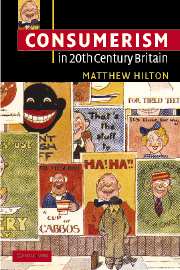Conclusion: the quantity or the quality of choice
Published online by Cambridge University Press: 10 December 2009
Summary
In a recent interview, Sheila McKechnie, the Director of the CA, was emphatic that her organisation did not represent a movement of either a social or a political kind. Her statement represents a remarkable end to a history of consumerism that has been precisely about the search for just such a movement. Yet McKechnie's statement stands in sharp contrast to the clear ideals of many consumer activists – concerned with either necessity or affluence – who have attempted to use the politics of price as the starting point for the basis of a rejuvenated and active social democracy, if not socialist democracy. In the public proclamations of the First World War Consumers' Council, the writings of co-operative demagogues such as Percy Redfern, the policy formulations of organisations such as Political and Economic Planning, the activities of ‘social entrepreneurs’ such as Michael Young and in the key speeches of consumer policy workers such as Michael Shanks, consumerism has been positioned as a middle way between the vested interests of trade unions and employers that not only aimed to establish a new universalist rhetoric but sought to engage the public in a plethora of institutions associated with civil society.
McKechnie's statement too had the additional purpose of distancing the current work and agenda of the CA from both its own past and the activities of other consumer organisations, be it the NCC, the OFT, the NFCG or even Consumers International.
- Type
- Chapter
- Information
- Consumerism in Twentieth-Century BritainThe Search for a Historical Movement, pp. 329 - 343Publisher: Cambridge University PressPrint publication year: 2003



